With the US democracy facing perhaps its gravest threat, from voter suppression to the decimation of the US Postal Service – activists are working doubly hard this year to ensure free and fair elections.
But present-day enfranchisement efforts often fail to acknowledge how the 70-year-long women’s suffragette movement has informed that work. “Before suffragists, you didn’t see groups engaging in public civil disobedience,” said Colleen Shogan, senior vice-president and director of the David M Rubenstein Center at the White House Historical Association. “No one had picketed in front of the White House before Alice Paul and others did on 10 January 1917.”
The movement culminated in the ratification of the 19th amendment on 18 August 1920, marking the end of one of America’s longest-running social justice movements. It produced the single largest enfranchisement effort in the nation’s history, guaranteeing women the right to vote. But it was only a beginning.
Many, especially Black women, did not benefit from the 19th amendment. But they did not waver in fighting for equal rights. Fannie Lou Hamer, among the leaders of the 1964 Freedom Summer Campaign and co-founder of the Mississippi Freedom Democratic party, carried her force into the civil rights movement. Dorothy Height, who was a key organizer of the 1963 March on Washington, helped found the National Women’s Political Caucus in 1971.
These women paved the way with a century-long history of female-led activism. And it is still women leading the charge. These are some of them.
Patricia Brigham
Florida: Brigham is the president of the League of Women Voters, Florida chapter.
Patricia Brigham considers herself a late bloomer.
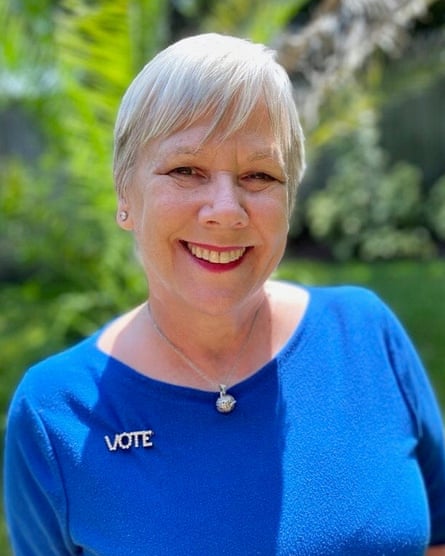
It wasn’t until her late 40s, following a long career as a radio broadcaster, that she says her life really began: At 47, she went back to graduate school; at 51, she started running marathons; and at 53, she got engaged to her now husband.
In early 2013, Brigham joined the League of Women Voters of Florida, the century-old non-partisan advocacy group born on the heels of the women’s suffrage movement.
After the Sandy Hook school shooting, Brigham led the league’s efforts pushing for gun legislation, forming the Florida Coalition to Prevent Gun Violence. Largely due to the group’s advocacy, the Florida legislature passed its first gun control law in over two decades.
Brigham was elected the league of Florida’s president in 2018, and took on the group’s core focus: fighting voter suppression. Over the past year, she has lobbied for the passage of the Voting Rights Advancement Act, a bill that would restore the Voting Rights Act dismantled by the US supreme court in 2013. In 2018, Brigham and her team also won approval for early voting sites at several college campuses. More than 60,000 Floridian college students voted early in the 2018 midterm elections.
The league also successfully pushed the Florida electorate to amend the state constitution to enfranchise Florida’s 1.4 million ex-felons. But after some brief success, the Republican legislature swiftly moved to gut the law.
In GOP-controlled Florida, lobbying to get out the vote during a crucial election year is a particularly rigorous battle. But Brigham says she feels strangely prepared for this, and she credits marathon running: “When you are suffering out in the Florida heat, you develop grit and strength,” Brigham said, remembering when she ran the marine corps marathon – with a fractured toe – and still finished the race
Cara McClure
Alabama: McClure is a veteran Alabama-based community activist, former director of Black Voters Matter, alumna of the Woke Vote fellowship program and creator of the non-profit Faith and Works, a civic engagement collective for faith leaders organizing their communities to vote.
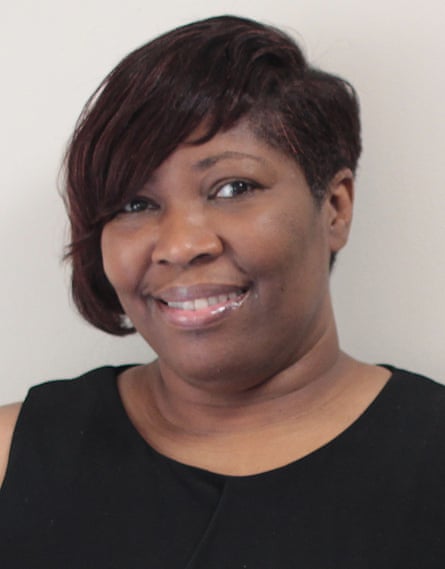
It was 13 July 2013. Birmingham-native Cara McClure was traveling to Memphis, Tennessee, to visit the Lorraine motel, where Martin Luther King was murdered in 1968. The television was on at the restaurant where she ate dinner. News from the trial of George Zimmerman, charged with the murder of 17-year-old Trayvon Martin, blasted through the room: acquitted of all charges.
Her cellphone rang. It was her 18-year-old son. “We both were just really quiet,” McClure recalled. “I had no idea how to comfort him. I was just as disturbed.”
To soothe her son, she told him they would go to a Black Lives Matter protest in Birmingham when she returned home. Since then, McClure, 51, has dedicated her life to mobilizing Black voters in her home state of Alabama, the birthplace of the civil rights movement. She founded the Black Lives Matter, Birmingham chapter, and became the Alabama state coordinator of Black Voters Matter. In late 2019, she launched her own non-profit, Faith & Works, which aims to empower faith leaders to organize their communities.
McClure is passionate about engaging “unlikely and unengaged voters”, that is, those who live in poor, rural districts and often lack internet access. Every Saturday since closures began, McClure and her team deliver more than 60,000lb of groceries to residents who live in Alabama’s public housing projects. While doing so, she talks to residents about their voter registration status.
McClure says she is able to relate to these communities especially well. She herself faced financial struggles when her husband left her in 2011. She posted an ad on Craigslist, “asking any generous folks to please let a mother and son in”. For three years, they hopped around and slept on strangers’ floors, homeless. “I was a housewife before that,” she said. “I had no money. I know what it’s like to be in a tight spot, and so I don’t judge anyone. I just listen.”
Tammy Baldwin
Wisconsin: The Wisconsin senator Baldwin, a Democrat, became the first female member of Congress in 1998, and the first openly gay challenger sent to Congress.
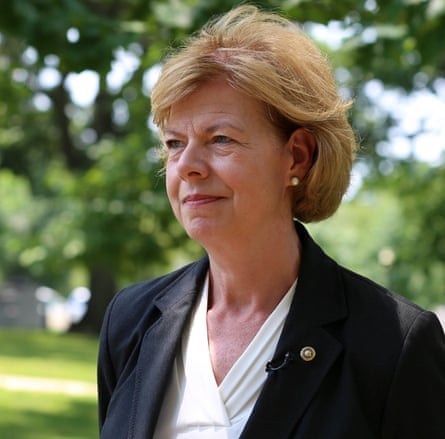
Tammy Baldwin says she first understood the power of women in politics as a member of the city council in Madison, Wisconsin. She and her colleagues debated that day in 1986 whether to fund a new nightly bus route for Madison Technical College on the outskirts of town. Students complained of a lack of safe transportation home from their night classes. In the first half of the meeting, only male members of the council spoke – scoffing at the proposal.
Finally, Baldwin remembers, a female council member stood up and told her story. She had attended night classes so that she could care for her children by day and recalled the many nights that she felt unsafe, walking home alone along dimly lit streets. Then, one by one, other women in the room stood up to recount their own stories. Once the women spoke, the bus route was approved.
Since she entered politics in 1986, Baldwin, Wisconsin’s first female member of Congress and the nation’s first openly gay challenger sent to Congress, has been making history, pushing healthcare reform and better representation in Congress among women and LGBTQ+ people. In 2017, Baldwin started the Women’s Suffrage Centennial Commission, a temporary federal panel with a goal to commemorate the centennial of the 19th amendment and to educate Americans about women’s suffrage.
These days, Baldwin is focused on fighting the troubling trend of voter suppression in Wisconsin, particularly to do with issues of redistricting – the state has some of the most gerrymandered maps in the country. In 2018, 53% of Wisconsinites voted Democrat on the ticket for state legislature, Baldwin said, but Democrats only occupy a third of the seats. “And Republicans know this,” she added.
From now until election day, Baldwin is in the midst of carrying out a number of initiatives to fight against these restrictions through widespread education. But for November, given expected slowdowns to the US Postal Service, she wants to make one message loud and clear: “Mail your ballot in two weeks early. Vote early. Vote early,” she said. “This is something we can absolutely control.”
Adrianne Shropshire
New York: Shropshire is a veteran political and community organizer, executive director of BlackPac, a national organization committed to promoting the Black political infrastructure.
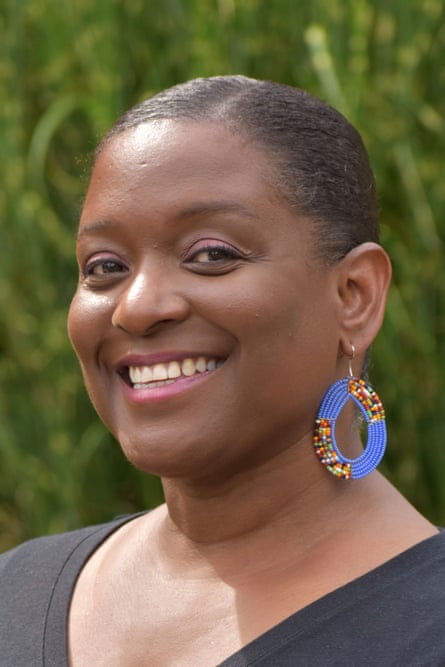
Spring, Los Angeles, 1992. Widespread riots broke out after four police officers were acquitted in the brutal videotaped beating of Rodney King, a local Black resident. Adrianne Shropshire, 23 at the time, was working for a local city council person, Mark Ridley-Thomas, and began to reconsider everything: “I don’t know that I need to be in city hall,” she recalls thinking. “I need to be in the community.”
Now, Shropshire is the co-founder and executive director of BlackPac, a Super Pac aimed at mobilizing Black Democrats, largely motivated by dwindling voter turnout in the community after Barack Obama left the White House.
BlackPac has scored critical wins. In Virginia’s first Trump-era election in 2017, BlackPac poured $1.1m into campaigns to get Black votes for Virginia Democrats in the statewide race, credited for keeping candidate Ralph Northam in the governor’s office.
Leading up to Alabama’s 2017 primary election, BlackPac funded several on-the-ground Black voter mobilization organizations, including Dejuana Thompson’s WokeVote. Analysts touted Black voter turnout as a major factor in Democrat Doug Jones’s victory for the US Senate. Black voter turnout also increased in the 2018 midterm elections.
“Of course we want to win elections, but success is defined a little bit differently for us,” Shropshire said. “The work that we do is about transforming the way Black people understand themselves as crucial voices in our democracy.”
Laura Miller
Washington DC: Miller is the mobilization director for When We All Vote, Michelle Obama’s voter mobilization non-profit. In 2012, she was the digital program manager for Barack Obama’s re-election campaign, and went on to become the digital director on Michelle Obama’s national book tour for Becoming.
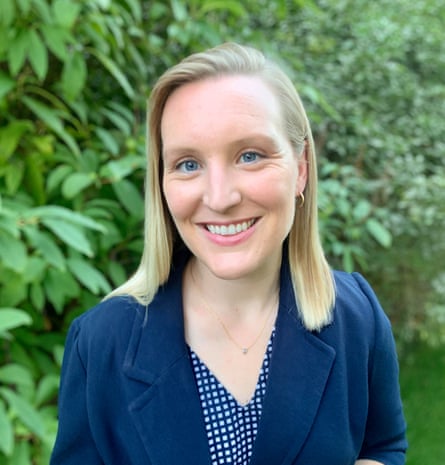
At first, Laura Miller, 31, viewed working in politics as a “side hustle”. Over the summers in high school, she would pass out literature on her state representatives door-to-door in the sweltering Illinois heat. In college, she applied at the very last second – and was accepted – to the prestigious White House internship in the Office of Digital Strategy, and started to consider politics as a viable career.
Then she “caught the Obama bug”. When she finished her White House internship, she began working as the digital program manager for Barack Obama’s 2012 re-election campaign.
When Michelle Obama started When We All Vote, her non-partisan voter registration non-profit in 2018, Miller was on part of a small team that figured out how to make it happen. As a bona fide digital strategy expert, Miller, who serves as the organization’s mobilization director, was perhaps more prepared than anyone when pandemic restrictions disrupted voter mobilization plans nationwide this year.
Instead of in-person, on-the-ground voter registration events, When We All Vote has been hosting virtual “couch parties” on Facebook Live since March, showing participants nationwide how to use the app Outvote, the initiative’s texting platform. During the virtual DJ-tracked “dance parties”, participants are encouraged to text eligible voters. After the first event, 500,000 eligible voters were texted and 19,000 people started or completed their registration application.
As a young woman in politics, Miller says she’s been lucky. On the Obama campaign trail, she said she was constantly surrounded by a slew of powerful women. “Seeing all these amazing women who continue to empower me and inspire me is something that I think was very unique to the Obama administration,” she said.
Dejuana Thompson
Washington DC: Thomspon is a political activist, consultant and the creator of Woke Vote, a non-profit focused on mobilizing an unprecedented percentage of Black millennial and faith-based voters in Alabama.

Imagining better communities is not a new concept for Dejuana Thompson. Her hometown of Birmingham, Alabama, is 80% Black, but she didn’t feel Black history was being represented in her high school’s curriculum. So, at 15, she organized a district-wide peer meeting to make it happen.
Decades later, Thompson, 37, started WokeVote in Birmingham in 2017, following a decade-long career in political strategy, including working on the Obama campaign in 2008 and with the Democratic National Committee. WokeVote now operates in 12 states. But Thompson has plans to expand it to all 50 states within five years, and build upon their international program (WokeVote currently has a chapter in Ghana, west Africa).
She has her plan carefully mapped out: “Engage, mobilize and turnout as many African American voters as possible to actually use their voice in November,” she said.
More specifically, this means 150,000 to 250,000 voters registered through WokeVote by election day, which she says they are well on their way to doing. “And then there are many, many longer-term visions,” she emphasized. “But this is the focus for now. I work incrementally.”
This article was supported by the GroundTruth project.
The standfirst of this article was amended on 18 August 2020 to correct how long it has been since the ratification of the 19th amendment.
